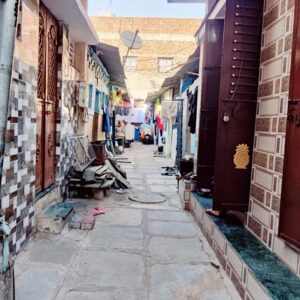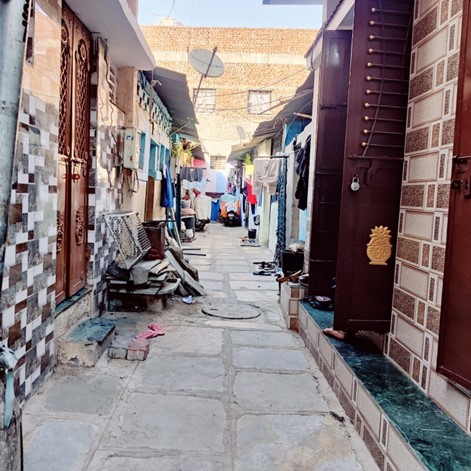A field visit in Ahmedabad with the Urban Management Centre
By Amita Bhakta

As the WASH sector strives towards achieving the Sustainable Development Goals, the need for long-term ‘sustainability’ is more relevant today than ever before in the face of trying to provide WASH infrastructure, and with it, address climate change, achieve gender equality and eliminate poverty. The past week has been historical as the UN Water Conference took place in New York. But whilst these top-level discussions happen, it is important we take a look, and learn from, the progress being made in the poorest parts of a rapidly urbanising Global South. In this blog, I share reflections from my recent field visit to a slum in Ahmedabad, where the Urban Management Centre (UMC) have worked with local women and children to transform their community, as part of my time working with them over January and February 2023.
After a drive through Ahmedabad and after leaving the car I followed my colleagues Nikita, Rishika and Krishna as we navigated narrow streets leading to the settlement, I was struck by the visibly distinct changes from the streets nearer to the main road and the streets further in. Uneven ground with mud and rock changed to fully paved streets with flat ground, and as someone with Cerebral Palsy, I was really surprised by how easy it was to get around. There was no open sewage strewn across the streets, which were really clean as if they were new. I was witnessing a ‘Swachh Bharat’ (Clean India) in this inconspicuous corner of Ahmedabad. But, how did this transformation occur? To find the answer, UMC took me to meet those at the heart of all the action: the women and children of the community.
In recent years, UMC have been involved in this community through their Moving India Towards Sanitation for All, or MISAAL programme, which aims to help India’s cities to sustain their open defecation free status. I was led into the house of a woman who is leading what UMC have called MISAAL Settlement Committees (MSCs), comprised of women from the local community of different backgrounds. Soon after, as I sat with the UMC team, members of the MSC filed in and sat with us. I was keen to learn more about their work and how the community had been transformed. As we sat and talked in Gujarati and Hindi, I was given a picture of how they as individuals and as a group took on the responsibility of creating a healthy environment for all in their community to live in, all with different roles. The MSC discussed how water supply and sanitation services had improved for the better, thanks to UMC’s interventions to enable them to directly engage with local government. But, these women wanted to make sure that it stayed that way. They explained how the committee took responsibility for monitoring how well the toilets and water points were being maintained through their ‘Bindi chart’, pasted onto a wall of some of the houses in the community as they showed me later during a walk through the slum. Each of the dots marked the slum residents’ perspectives on how well they felt WASH services were being provided on any given day, for them to communicate back to the authorities in Ahmedabad through UMC’s support. Therefore, we can only ensure WASH services in India and beyond are sustainable by sustaining easy-to-use monitoring tools for and within communities to use themselves, which are accessible for all and used in a transparent way for the community to see where progress is being made.
But this work was not done by the women alone. Soon after we started talking, a group of young children piled into the room. As we distributed sweets among them, I learned about the vital role that these young faces were playing in transforming their communities. Teaching children about the importance of handwashing and general hygiene and cleanliness was key to spreading the word further for UMC on how to sustain the improvements in the slum. Engaging children meant that the MSC has been equipped with extra voices to get their message across, not to mention extra pairs of eyes to see where WASH services are falling short. I was really struck by the efforts that my colleagues at UMC had made to get to know the children, the women and their families by name, following their progress over time. In this sense, whilst at first sight we see improved WASH infrastructure, new facades on housing and paved streets as markers of the inroads that the community has made in terms of the physical development of the settlement thanks to UMC’s interventions, it is also about social connection to the people that make the place what it is.
Simply installing taps, pipes and toilets, even if fully inclusive, barely scratches the surface for what is needed to achieve sustainable WASH for all. It needs to be about us as WASH and development ‘experts’ letting go and giving communities the chance to take ownership and control of their future development. We as WASH professionals have the chance to use participatory techniques from the inception of our programmes to enable diverse stakeholders across gender, age, caste, occupation and more to be actively engaged in the achievement of the Sustainable Development Goals. But, this means going beyond just ‘hearing’ the voices of people in communities where WASH interventions are being made, but as WASH professionals, equipping communities with the knowledge and creative tools they need to develop and sustain their essential services. What I saw in the slums in Ahmedabad was a programme developed by UMC that has scope for a lot of replicability, with positive implications for women’s livelihoods such as getting involved in the critical roles to achieve ‘sustainable’ sanitation, forming small enterprises and more. But this could only be achieved through UMC’s unparalleled efforts on the ground.
As we reflect on the discussions at the UN Water Conference at the top level, let’s not forget the essential work being done at the grassroots, by those whose rights to WASH are yet to be realised. Only then can we find routes to deliver WASH for all.
Acknowledgement
Thank you to Manvita Baradi and Meghna Malhotra for giving me the opportunity to work with the Urban Management Centre in the early weeks of 2023, and for arranging this visit. Thanks go to Krishna Patel, Nikita Popat and Rishika Srivastava for their excellent support in the field and for facilitating this unique opportunity to learn so much- and change my perspective- on how inclusive WASH for all can be achieved.
